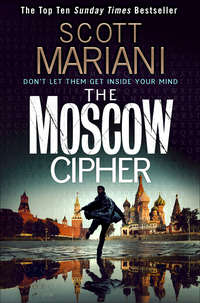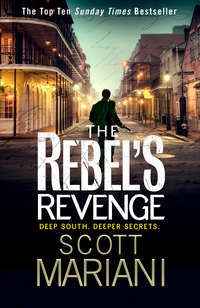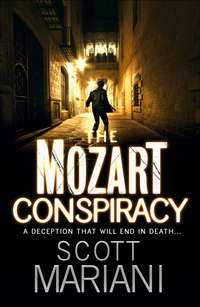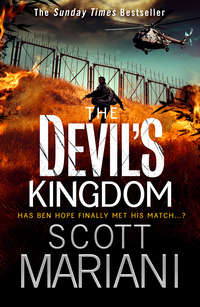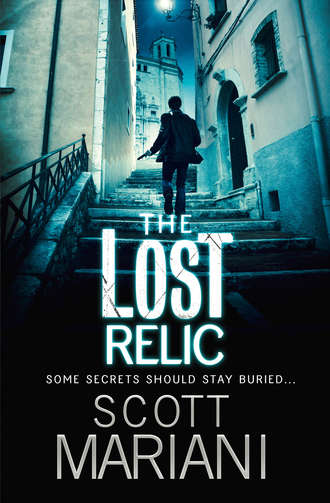
Полная версия
The Lost Relic
‘So what was it you wanted to talk to me about?’ Boonzie asked as Ben poured a fresh load of cement into the barrow. ‘You didn’t come all the way here to shovel shite.’
‘Mirella seems like a lovely lady,’ Ben replied, avoiding the question.
‘Love at first sight, Ben, if ye could believe in such a thing. There I was in Naples. It was only meant to be a weekend away from getting soaked to the bollocks on some fucking God-forsaken hillside somewhere training a bunch of ignorant squaddies. I’m sitting in this wee restaurant sucking up spaghetti like there’s no tomorrow and wondering how the fuck I’d got by on pot noodles and ketchup for all those years, when I hear screams from the kitchen and this guy comes running out like the hounds of hell’re tearing at his arse. Then next thing a saucepan flies out the door after him and almost takes my ear off.’
‘You’re kidding me,’ Ben chuckled.
‘I look up,’ Boonzie went on tenderly, ‘and there’s this fuckin’ apparition standing there in the kitchen doorway, still in her apron. Never seen a woman so wild. And I thought, Boonzie, that’s the one you’ve been looking for. Three days later, we were engaged and I’d put in my resignation. Hitched by the end of the month. I haven’t been back to Blighty since. And I dinnae miss it, either.’
‘I can see that. You picked a perfect spot, Boonzie.’
‘Isn’t it?’
‘How did Mirella take to country life after Naples? She doesn’t feel too isolated out here?’
Boonzie used the back of his shovel to spread wet cement over the footings of the greenhouse. ‘When she first saw the place she was a wee bit worried about intruders and the like. Some friends of hers got burgled down in Ríccia.’ He grinned up at Ben, and his eye sparkled. ‘But she’s got no worries with me, Ben. I have my peace of mind, if you know what I mean.’
Ben did. He didn’t need to ask.
‘What about you?’ Boonzie said.
‘Me?’
‘Aye, did you ever settle down?’
‘I lived in Ireland for a while. Live in France now.’
‘What about a woman?’
Ben hesitated. The face that instantly flashed up in his mind’s eye belonged to a woman called Brooke. He held the image there for a long moment, seeing her warm smile, the auburn curls falling across her eyes as she laughed. He could almost smell her perfume, almost feel his hands stroking her skin. ‘Yeah, there’s someone,’ he said, and then went quiet.
Silence for a beat, and then Boonzie asked, ‘So are you going to tell me what you’ve come all this way for?’
‘It’s not important now.’
‘Ben, you’re like a son to me. Don’t force me to beat it out of you with this shovel.’
Ben gave a shrug. ‘OK. I came here to offer you a job.’
Chapter Four
Georgia
Grigori Shikov’s private study was a place few people were allowed to visit. For some it was a privilege; for others a summons to the luxurious boathouse in the villa’s sprawling grounds, escorted by silent men in dark suits, spelled doom.
The dark-panelled room was filled with the treasures Shikov had assiduously collected over forty or more years. The vast antique sideboard behind him was dominated by a magnificent lapis lazuli bust of Frederick the Great. On an eighteenth-century gilt-bronze rococo commode by André-Charles Boulle stood a globe that had once belonged to Adolf Hitler; but it was the extensive collection of artefacts from Imperial Russia, dating between 1721 and 1917, reflecting Shikov’s lifelong passion for what he proudly regarded as his homeland’s golden era, that had earned him the nickname ‘the Tsar’. And it fitted him perfectly.
Of all the historic objects in Shikov’s study, the most physically impressive and intimidating was the immaculate 1910 Maxim water-cooled heavy machine gun, complete with its original wheeled carriage. It occupied the corner of the room, its snout aimed directly towards whomever might be sitting across from him at his massive desk. Between the fixed stare of the machine gun muzzle and the hard glower of the grizzled old mob boss, nobody could fail to be shrivelled to a pulp.
Nobody except Anatoly, Shikov’s only son, who at this moment was lounging in the plush chair as the old man leaned heavily on his desk and outlined the job he wanted done for him.
The third man present at the meeting was Yuri Maisky, Shikov’s nephew. He stood by the desk with his hands clasped behind his back, keeping quiet as his uncle did the talking. Forty-seven years old, small and wiry, Maisky secretly attributed his thinning hair and the deep worry lines on his brow to the strain of working for Shikov’s organisation for most of his adult life. He loved his uncle, but he also feared him.
There weren’t many men whom Maisky feared more than his boss. One was the boss’s son. When the old man looked at Anatoly all he saw was his beloved only child, his pride and joy; Maisky saw a thirty-four-year-old psychopath with a blond ponytail. The face was long and lean and chiselled, the eyes were quick and dangerous. Maisky’s belief that Anatoly Shikov was clinically insane was one he kept closely to himself.
Shikov could sense the tension emanating from his nephew. He knew that most of his associates and employees lived in dread and loathing of Anatoly. That just made him prouder of his only child, although he would never have shown it. Outwardly, he acted gruff and commanding.
‘Are you paying attention?’ Shikov snapped at Anatoly, interrupting himself.
‘Sure.’
‘Have you been drinking?’
‘Of course not,’ Anatoly lied. The Tsar abhorred alcohol. Anatoly did not. He shifted in the chair and glanced down to admire the hand-tooled perfection of his latest purchase, the alligator-skin boots he’d been trying to show off all day by turning up the legs of his Armani jeans. But not even Anatoly would have dared to put his feet up on the old man’s desk. ‘I’m listening. Go on.’
Anatoly had done plenty of jobs for his father, and it was something he enjoyed being called upon to do. Most guys he’d known who had worked for their dads had to go to the office, wear a suit and tie, attend meetings and conferences, sell shit of one kind or another. Not him. He felt highly privileged to be a valued member of the family firm. He and his old buddy Spartak Gourko had once kept a snitch alive for seventeen days under hard torture to extract a list of names of traitors in their organisation. Another time, Anatoly had spread-eagled a man between four posts in the ground, chains around his wrists and ankles, and lit a cigarette as Gourko drove a pickaxe through the guy’s sternum. When old Spartak got going, he was something to behold.
Anatoly enjoyed his work. He never asked questions about his father’s business, partly because you just didn’t ask the Tsar questions about his business, and partly because Anatoly didn’t really give a damn why things got done the way they did. The only questions he generally asked in life were ‘Can I own it?’; ‘Can I fuck it?’; ‘Can I kill it?’. If the answer to any of the above was negative, he quickly lost interest.
This new job sounded like fun, though.
‘Our sources tell us that the piece of artwork in question will definitely be part of the exhibition,’ Maisky said.
‘And I want it,’ Shikov finished in his gravel voice. ‘I will have it.’
The sheaf of papers spread out across the desk was the report on the gallery’s security system, put together by one of the many experts on Shikov’s payroll, a usefully corruptible Moscow security tech engineer who had leaned on contacts in Milan to get the information they needed. The seventeen-page document contained the technical data on the bespoke alarm system recently installed into the gallery building whose photographs, taken with a powerful telephoto lens from a variety of angles just days before, were clipped together in a file next to the report.
Anatoly hadn’t heard the old man doing this much talking in years. Half-listening as his father went on, he flicked through the series of photos. The location in Italy was printed at the bottom. He could see that the gallery was an extension of a much older building. The kind of new-fangled architecture that appealed to arty types. It had only just been built; in the pictures that showed the rear of the gallery, he could see that the groundworks weren’t fully finished, with patches of freshly-dug earth and a half-built ornamental fountain. There was a works van present in two of the pictures, a slightly battered Mercedes with the company name SERVIZI GIARDINIERI ROSSI just about visible on the side.
Italy, Anatoly thought. That was cool. He’d never been there before, but currently had two Ferraris, one red, one white, and most of his wardrobe came from there as well. He even spoke a bit of the language, mostly aped from the Godfather movies. Girls loved it. Yes, Italy was fine by him. Anatoly could appreciate art, too, as long as it involved depictions of naked female flesh.
Sadly, the item his father seemed so desperate to acquire depicted nothing of the sort. Anatoly glanced at the glossy blow-up taken from the exhibition brochure. Just some colourless drawing of a guy on his knees praying. Who would desire such a thing? Obviously it was worth some serious cash, strange though that might seem.
‘You’re not listening to me, boy.’
‘You were saying the alarm system’s a bastard.’
Maisky cleared his throat and cut in politely. ‘That’s putting it mildly. The perimeter protection system is state of the art. If you can get through it, the building is filled with cameras watching from every possible vantage point. The inside of the gallery itself is scanned constantly by photo-infrared motion sensors that could pick up a cockroach. The whole thing is automated, and the only way to override it is to enter a set of passcodes that are kept under lock and key in three separate locations. You need all three to disable the system. Furthermore, the passcodes are randomly re generated each day by computer, in staggered intervals so that the combination’s constantly changing. Any breach of the system will trigger the alarms as well as sending an instant signal to the police.’
‘Seems impossible,’ Anatoly ventured.
‘Nothing is impossible, boy.’ Shikov snatched a printed sheet from his desk and flipped it over.
Anatoly picked it up. There were three names on the sheet, all Italian, all unknown to him. De Crescenzo, Corsini, Silvestri. Beside each name was an address and a thumbnail picture. De Crescenzo was a gaunt-looking man with thinning black hair. Corsini was round and fat. Silvestri looked like a preening popinjay, a man in love with himself even when he didn’t know his picture was being taken. ‘Who are they?’
‘The three men who hold the passcodes,’ Maisky told him.
‘Now here’s the plan,’ Shikov said. ‘Tomorrow evening is the inaugural opening of the gallery. Invitation only, some local VIPs and art critics, people like that, about thirty-five in all. All three passcode holders will be present. Your team will be waiting as they leave, and follow them home. At 3 a.m., you’ll snatch them simultaneously from their homes, bring them back to the gallery and make them enter the codes. How you do it is up to you, but you keep them alive.’
‘Right. And then we go in and grab what we came for.’
Maisky had been waiting for the first sign that the hotheaded young punk was going to handle this in his usual reckless way. Here we go, he thought.
‘It’s not that simple,’ he said. ‘Because the only time the owners might have to override the alarm system would be an emergency situation such as a fire, earthquake or other potential threat to the valuable contents of the gallery, the system’s designers built in a function that will send an automatic alert to the police should the override codes be entered. That function is hard-wired into the system and can’t be disabled remotely in any way. It uses a broadband frequency via the optic fibre landline, with cellular backup in the event that the main lines are down. So it’s essential that before you go in, you ensure that the landline is chopped. And that you use this.’ He pointed at a device sitting on a side table. Anatoly had been eyeing it, wondering what it was. A plain black box, about twelve inches long, wired up to four patch antennas.
‘It’s an 18-watt ultra-high power digital cellphone jammer,’ Maisky explained. ‘It will work in all countries and block the signal from any type of phone, including 3G, over a radius of 120 metres. With this in place, the police won’t have a clue what’s going on.’
‘And if any of the owners decides to get smart and punch in a duress signal that could trip the silent alarm, they’re wasting their time,’ Shikov added.
‘So then I can pop them.’
‘Not until you have the item safely in your possession,’ Maisky said as patiently as he could. ‘Once you’re in, you have to take care of the secondary system as well. Each painting is rigged so that any attempt to remove it from the wall will set off a separate alarm.’
‘So what? If the phones are down—’
‘It also fires the automatic shutter system. A sensitive electronic trigger is hooked up to a hydraulic ram system that will slam shutters down to protect the artwork. The shutters will resist attack from bullets, blowtorches, and cutting blades. They will also automatically block every possible exit and imprison the intruder like a trapped rat until the police come and take them away. And there’s no override code for that. It can’t be reversed.’
‘Are you following all of this, Anatoly?’ Shikov said, watching his son closely from across the desk.
Anatoly shrugged, as if to say all this kind of stuff was child’s play to him.
‘Good. Go and assemble four of your best men. I’m thinking of Turchin, Rykov, Petrovich—’
‘And Gourko,’ Anatoly cut in.
Oh no, Maisky thought, his heart going icy. Not Gourko. Anatoly’s closest crony, the scarred bastard who’d been dishonourably drummed out of the Russian army’s Spetsnaz GRU Special Forces unit for beating one of his officers half to death with a rifle butt. The kind of gangster who gave gangsters a bad name, and one of the few other people who frightened Maisky even more than his boss.
‘You have two hours,’ Shikov said. ‘And then you’re on your way to Italy. You’ll rendezvous with our friends on the ground.’
‘How many in the team?’
‘Ten. Eight men inside, two on the outside.’
Anatoly nodded. ‘Hardware?’
‘Everything you need.’
Anatoly smiled. He could trust his father to be thorough on that score.
When Anatoly had left the room a few minutes afterwards, Shikov gathered up the scattered paperwork and slid it into a drawer. It would be burned later. Maisky circled the desk, frowning. His head was full of things he wanted to say. Things like, ‘Are you so sure you can trust Anatoly with this? He’s wild and irresponsible and his friends are all maniacs, especially Spartak Gourko. How can you be so blind, uncle?’ But he had the good sense to say nothing at all.
Yuri Maisky wasn’t the only one keeping his thoughts to himself. As Anatoly walked away from the boathouse, flipping his Ferrari keys in his hand, he was already thinking about how overcomplicated and boring his father’s plan was.
He had other ideas.
Yup, this was going to be fun.
Chapter Five
‘A job?’ Boonzie said, raising his eyebrows.
The sun was beginning to dip over the hills, throwing a wash of dramatic reds and purples across the skyline. Ben nodded. Crouching on the ground beside the new greenhouse foundations, he fished out his Zippo lighter and a pack of the same Gauloises cigarettes he always smoked.
‘Those fuckers’ll kill you,’ Boonzie muttered.
‘If something else doesn’t beat them to it. Want one?’
‘Aye, why not. Chuck them across.’ Boonzie kicked over the empty barrow and used it as a seat while he lit up.
‘At the place where I live in France, I run a business,’ Ben explained. ‘We’re out in the countryside; not so different from this place in a lot of ways. But we don’t make pesto sauce. We do K and R training work.’
Boonzie didn’t need Ben to spell out that K and R stood for kidnap and ransom. Ben went on talking, and Boonzie listened carefully.
In the seven years since Ben had quit the army, locating and extracting victims of kidnapping, often children, had become his speciality. He’d called himself a Crisis Response Consultant – a deliberately vague euphemism for someone who went out and solved problems that lay way beyond the reach of normal law enforcement agencies. His work had taken him into a lot of dark corners. His methods hadn’t always been gentle, but he’d got results that few other people in his line of work could have achieved.
The bottom line, always, was helping those in need. After many successes and a few too many scrapes, he’d left the dangers of active field work behind to focus on passing on the skills and knowledge he’d acquired – still helping the innocent victims of ruthless criminals across the globe, but now doing it from behind a desk instead of from behind a gun.
The facility he’d set up, nestled in the Normandy countryside, was called Le Val. It had been growing busier by the month. Police and military units, hostage negotiation specialists, kidnap insurance execs, close-protection services personnel, had all flocked to attend the courses he ran there with his assistant, ex-SBS officer Jeff Dekker, and a couple of other ex-military guys. Dr Brooke Marcel, half French, half English, an expert psychologist based in London, had been his consultant and regular visiting lecturer in hostage psychology until – three months or so ago – their stumbling relationship had developed into something deeper.
In terms of the success of the business, Ben couldn’t have asked for more. Le Val was lucrative, it was filling a very real need, and it was safe.
But there was a problem. It had started as just a grain of discomfort, like a tiny niggling itch he couldn’t scratch. Through the long, hot summer, it had grown until it followed him like a shadow and he couldn’t sleep at night for thinking of it.
Why he felt this way, where the demons that were driving him so crazy with restlessness had come from, he had no idea. All he knew, with a certainty that frightened him, was that the life he’d created in France was one he no longer wanted.
Boonzie McCulloch was the first person he’d chosen to confess his secret to, and even after thinking about little else for days it wasn’t easy to do. When he’d finished outlining the work he and his team did at Le Val, he took a deep breath and came right out with it.
‘Thing is, I’m giving serious thought to leaving it all behind,’ he admitted with a frown. ‘I don’t mean I want to sell up. Just walk away, leave it in Jeff’s hands. He can run the place, no problem, with a little help from the other guys, and Brooke. And you, if you’re interested.’
Boonzie took a draw on his cigarette, said nothing. His eyes were narrowed to slits against the falling sun.
‘You were the best instructor I ever knew,’ Ben said. ‘I can’t think of anyone I’d rather have come and take over the number two position.’
‘What about you?’ Boonzie asked. ‘Where are you going?’
Ben was quiet for a moment. ‘I don’t know,’ he said. ‘I’m not sure what I want. Maybe I need some time to figure that out.’
‘Every man has to settle down sometime, Ben. It comes to us all.’
‘I don’t know if I’m the settling kind. God knows I’ve tried. Just doesn’t seem to work for me.’
‘You never were happy unless your arse was on fire,’ Boonzie chuckled, and then looked serious. ‘What about this Brooke lassie? Sounds like you and she have something going.’
Ben glanced down at his feet. ‘That’s what I thought, too,’ he muttered. ‘Sometimes I’m not so sure. For a while she’s been acting—’ His voice trailed off. He bit his lip.
‘What?’
Ben let out a long sigh. ‘Listen, I don’t want to lay my personal problems on you. What do you think about my offer? Is it something you’d ever consider?’
Boonzie didn’t reply. He thoughtfully stubbed out the butt of his cigarette on the belly of the upturned barrow.
Ben already knew the answer. He’d known it the moment he’d got here, and it had been so obvious and predictable that he almost hadn’t asked the question. So he wasn’t very surprised when after a few more moments’ deliberation, looking genuinely pained, Boonzie shook his head.
‘Flattered you should ask me …’
‘But no?’
‘That’s the way it has to be. I’m sorry, Ben.’
‘Say no more, old friend.’
‘Would you leave this?’
‘Not in my right mind, I wouldn’t.’ Ben stood up and dusted himself off.
‘No hard feelings, then?’ Boonzie said, concern in his eyes.
‘Don’t be daft. I’m happy for you.’
‘You’ll stay for dinner, though, aye? Be our guest for the night?’
‘Of course.’
Boonzie had been right about Mirella’s cooking. Dinner was a simple dish of tagliatelle mixed with a basil pesto sauce of the most vivid green, topped with grated parmesan and accompanied by a local wine. It was as far from fancy cuisine as you could get, but just about the best thing Ben had ever tasted and he ate a mound of it with relish under the chef’s approving gaze. As they sat up until late around the plain oak table in the small dining room, he almost managed to forget all the troubling thoughts that had been on his mind lately. Boonzie told stories, more wine was poured, the fresh night air breezed in through the open windows and the cicadas chirped outside. It was after one when Ben insisted on helping the couple clear up the dishes, and Mirella showed him up to the guest bedroom.
He was awake long before dawn, edgy and feeling the need to go for a run. He slipped out quietly and spent an hour jogging in the open countryside, pausing a while to watch the sunrise before returning to the house to shower and put on clean jeans and a light denim shirt over a navy T-shirt that said ‘TYRELL Genetic Replicants – More Human than Human’. A present from Brooke. She was a big Blade Runner fan. Ben hadn’t seen the movie.
Breakfast was in the kitchen, eggs laid that morning scrambled with butter and toast as Mirella fussed and Ben kept protesting that he’d had enough delicious food to last him a week.
‘No hard feelings,’ Boonzie said again, frowning at him over a steaming cup of espresso. ‘About what we discussed?’
‘None whatsoever, Archibald,’ Ben said.
‘Piss off. So where’s next? S’pose you’ll be heading back to France?’
Ben shook his head. ‘I have a flight booked from Rome to London tomorrow afternoon.’
‘Business trip?’
‘It’s a long story.’
Boonzie and Mirella waved as Ben climbed into the Shogun. He waved back, took a last glance at the tranquil haven they’d made their home and then drove off down the bumpy track towards the road.
Chapter Six
Ben headed roughly south-southwest with the rising sun behind him, aiming more or less in the direction of Naples with the intention of veering slowly towards Italy’s west coast. From there, he’d follow the coastal road through a hundred seaside towns and villages until eventually he reached Rome.
For a man who’d been running this way and that for most of his life, always with a precisely calculated plan in mind, always battling the clock, it felt strange to be at something of a loose end. Strange, yet welcome too – because, for the first time, he wasn’t looking forward to his trip to visit Brooke in London. A month earlier, he’d have been racing to get there.
What had changed? That was the question in his mind as he drove. For the hundredth time he raked back in his mind through all their conversations, things he might have said to upset her, anything he might have done wrong. He couldn’t think of a single reason. There’d been no arguments between them. No falling out, nothing to explain why things should be less than deliriously perfect. Almost three months of what he’d thought was a happy, loving, warm relationship.


